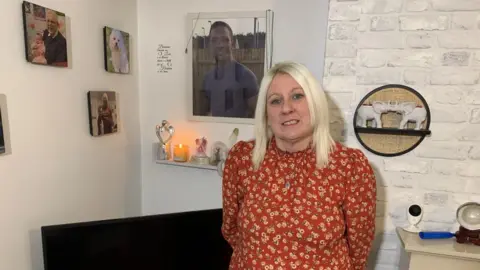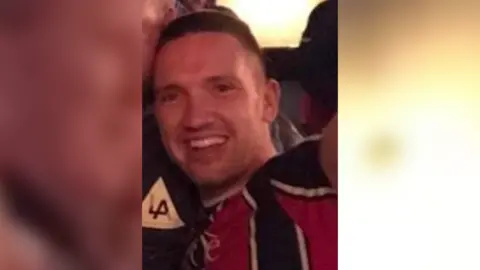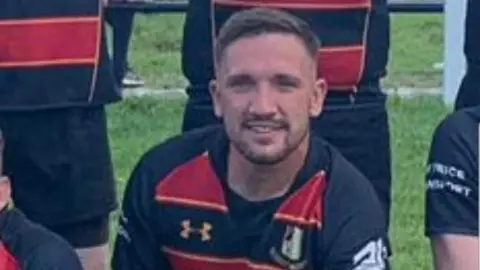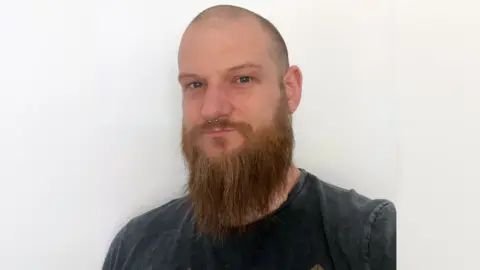Mental health: Rugby club trains first-aider after suicides
 BBC
BBCA rugby club has trained a mental health first-aider after two players took their own lives.
One of those, Geraint Edwards, 26, took his life during the Covid pandemic in June 2020 after "hiding his feelings", his mother Joanne Hedges said.
He died months after his grandfather also killed himself, and she said her pain goes on every day.
She hopes her son's story can make a difference to others who are struggling.
Abercrave rugby club, near Ystradgynlais in Powys, has trained a player in mental health issues in the hope it will encourage men to speak out.
Ms Hedges said: "Geraint was one of a kind, he'd help anyone and could be bubbly, but could get down and he always had his struggles, but he couldn't talk about his own feelings."
Geraint was a keen sportsman, a good footballer and rugby player, who previously worked with the charity Street Football Wales, she said.
"He fitted so much into his short life," she said.
 Family photo
Family photoMs Hedges felt her son struggled during the pandemic and lockdowns, and he was very close to his grandfather Dennis, 80.
Following her father's death, Geraint called her every day to check she was OK.
'Upset and traumatised'
"They were two peas in a pod," said Ms Hedges.
"They had a really strong bond and when my dad died, Geraint did really struggle. He missed him. But Geraint would ring me every day because I was close to my dad, and I was really upset and traumatised by it."
 Abercrave RFC
Abercrave RFCShe added: "So, he'd ring and say, 'Mam, you OK? You're not going to do anything silly now', but all along he was hiding his own feelings."
Ms Hedges is now training as a nurse and said it had been a big help to focus on a new career and helping people.
'He just wanted the pain to stop'
She said: "Geraint couldn't deal with it any more, instead of just turning and talking, suicide was his way out.
"He just wanted the pain to stop. But our pain goes on every day."
Ystradgynlais Mind started a campaign called Frame of Mind, backed by actor Michael Sheen, which trains people to be mental health first-aiders in areas where men traditionally do not talk about their mental health.
Gareth Brookes, who plays for two rugby teams in the area, Abercrave RFC and Yogits Vets Touch Rugby, trained as a mental health first-aider after Geraint's death.
"At Abercrave, we lost two people in the second team to suicide during the pandemic, including Geraint," he said.
"We had no-one acting as a mental health first-aider. I was happy to take on that role. I'm not a counsellor, but I put myself out there for any of the boys that need to talk.
"Since then, seven of them have been in touch to say they were struggling, some with depression and anxiety, some with PTSD. I've been able to signpost them towards getting help. I also intervened when someone was considering suicide."
 Gareth Brookes
Gareth BrookesMr Brookes said he wanted to normalise speaking about mental health.
"I've experienced anxiety and depression myself. I've had a number of rounds of counselling and self-help courses, which I feel gives me the empathy to understand what the boys are going through," he said.
"I've learned from my own experiences that talking really does help and that's the message I get through to the boys to talk before things spiral out of control."
'Stiff upper lip mentality'
Donna James, the lead on the campaign for Mind Ystradgynlais, said: "There is a cultural stigma.
"There has long been this stiff upper lip mentality and men shouldn't cry which is seen as strength, but it is a weakness because it's making them ill. By not saying 'I'm not ok' is killing them.
"Seventy-five percent of people who died from suicide were not known to groups like us or their GPs.
"That's why mental health first-aider model is so important because it's giving them that person to go to, who they feel more comfortable to talk to. I think this campaign has saved lives and will save more."
If you have been affected by the issues in this story, the BBC Action Line has links to organisations which can offer support and advice.

- TRAPPED UNDER THE GROUND: The remarkable 54-hour-long rescue of George Linnane
- IOLO: A WILD LIFE: Iolo delves into the archives from the past 25 years

